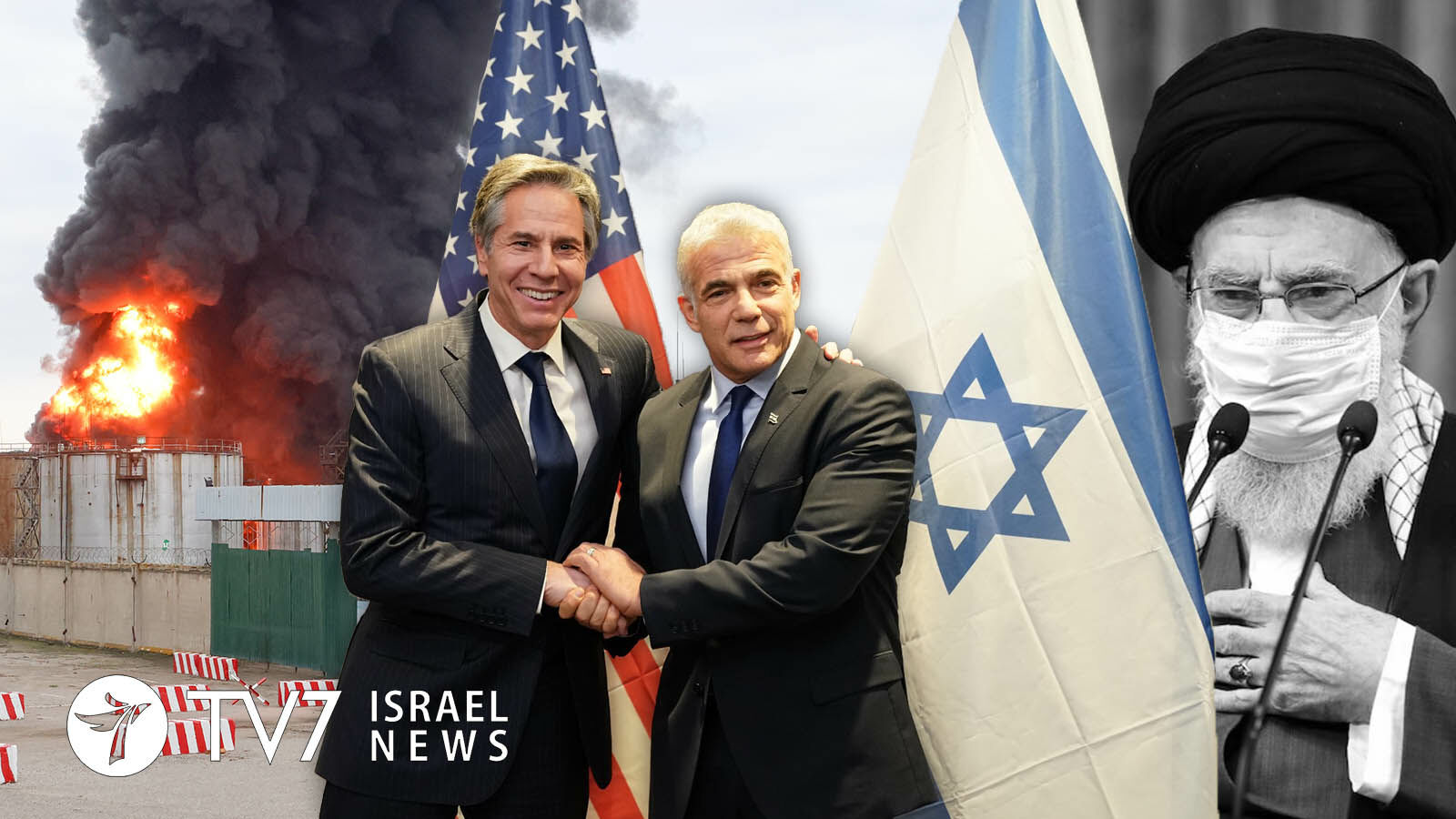The meeting comes after Israeli Prime Minister Naftali Bennett held surprise talks with Russian President Vladimir Putin in Moscow over this past weekend at the request of Ukrainian President Volodymyr Zelenskyy.
By Erin Viner
Israeli Foreign Minister Yair Lapid met with United States Secretary of State Antony Blinken in the Latvian capital of Riga on Monday.
At the start of the meeting, Lapid remarked that he “came here to meet with a friend and a partner in a moment in which the world order is changing. The war that is going on in Ukraine, and the nuclear talks in Vienna are events that are changing the world as we know it.”
“I want to thank the Administration and you my friend for the leadership you’ve demonstrated in these days. There’s no real alternative to American leadership that is determined to prevent wars and bloodshed,” he said, underscoring that, “Israel is totally committed to doing everything possible to stop the war in Ukraine. We have condemned the Russian invasion and we still do. And Israel is a partner in the global effort to make sure and clarify that this war must be stopped.”
According to US State Department Spokesperson Ned Price, Secretary Blinken and his Israeli counterpart met “to exchange views regarding how to stop the premeditated, unprovoked, and unjustified attack by Putin’s military forces on Ukraine and its people as well as the urgent need for Russia to cease its aggression, allow for humanitarian corridors, and fully withdraw from Ukrainian territory.”
Blinken said the US appreciates any efforts of its allies “to see if there’s any opening to end the war,” and insisted that any solution must ensure the independence and territorial integrity of Ukraine.
Russia claims its “special military operation” was launched to disarm Ukraine and remove leaders it describes as neo-Nazis, while Kyiv and its Western allies allege that Moscow’s offensive is a transparent pretext for an invasion to conquer a nation of 44 million people.
Committing to the “continuation of joint efforts to stop a brutal and unnecessary war,” Minister Lapid said that “Israel is assisting in the mediation effort together with Germany and France” while acting in “in full coordination” with the US, which he said was Israel’s “greatest and closest ally” with whom we share “values and a strategic vision regarding the required steps. “
“There is no justification for violating Ukrainian sovereignty and killing innocent civilians,” reiterated Lapid, who also serves as Israel’s Alternate Premier, adding, “Under the leadership of Prime Minister Bennett, Israel is maintaining continuous contact with Russia and President Putin as well as with Ukraine and President Zelenskyy. We have one goal: to stop the war and prevent more suffering and victims.”
Israel has “been actively assisting Ukraine since almost the first day of fighting,” said the Israeli Minister.
So far, Israel has already airlifted 100 tons of humanitarian aid while dozens of Israeli companies, organizations, and private individuals are currently offering wide-ranging assistance to to Ukrainians impacted by the war. The Israeli Ministry of Foreign Affairs (MFA) has also established the Matat Donation and Coordination Center to centralize an outpouring of help from Israeli civil society to the Ukrainian people.
Matat will operate in parallel to the humanitarian assistance provided by Israel’s Mashav national aid agency. At the direction of Foreign Minister Lapid, Mashav is currently focused on four major aid efforts: to create a field hospital in coordination with the Ministry of Health and Sheba Hospital, maintain the ongoing transfer of humanitarian aid (with emphasis on medicine and medical equipment), provide six large generators to the hospital in Lviv, and establish refugee assistance centers at border crossings where Israeli representatives are operating (with an emphasis on provision of winter gear to refugees exiting Ukraine).
While Israel will participate “in the international effort to assist refugees from Ukraine” including the absorption of non-Jews as a humanitarian gesture, Lapid stated that “our main effort is bringing tens and possibly hundreds of thousands of Jews to Israel.”
While not a party to the ongoing nuclear negotiations between Tehran and world powers in Vienna to revive the 2015 Joint Comprehensive Plan of Action (JCPOA), Israel has steadily conferred with the US administration in hope of reaching a stronger agreement than the original deal to prevent the Islamic Republic from acquiring atomic arms.
“It’s not secret we have our differences on this, but it is a conversation between allies that have a common goal which is to prevent Iran from becoming a nuclear threshold country,” Lapid said, stressing, “The nuclear agreement which stands to be signed in Vienna is a bad and ineffective agreement. Israel isn’t obliged by it and reserves the freedom to act in any way against the Iranian nuclear program.”
Jerusalem’s top diplomat went on to emphasize that the Ukraine war “is a reminder to the State of Israel: we have friends, and we have allies, but our security always needs to be only in our hands. What keeps us alive in a dangerous world, is the fact we have an army. A strong and smart army. An army which will protect the State of Israel.”
State Department Spokesperson Price underscored that during discussion on “challenges posed by Iran” both Israel and the US “agreed that Iran must never be allowed to acquire a nuclear weapon.” He added that “Secretary Blinken reiterated the Administration’s ironclad commitment to Israel’s security.”
Russia said on Saturday that Western sanctions imposed over Ukraine had become a stumbling block for the reaching of a deal with Iran.
Russia, China, Germany, France and the United Kingdom are the remaining partners to the deal from which former US President Donald Trump withdrew in 2018.
